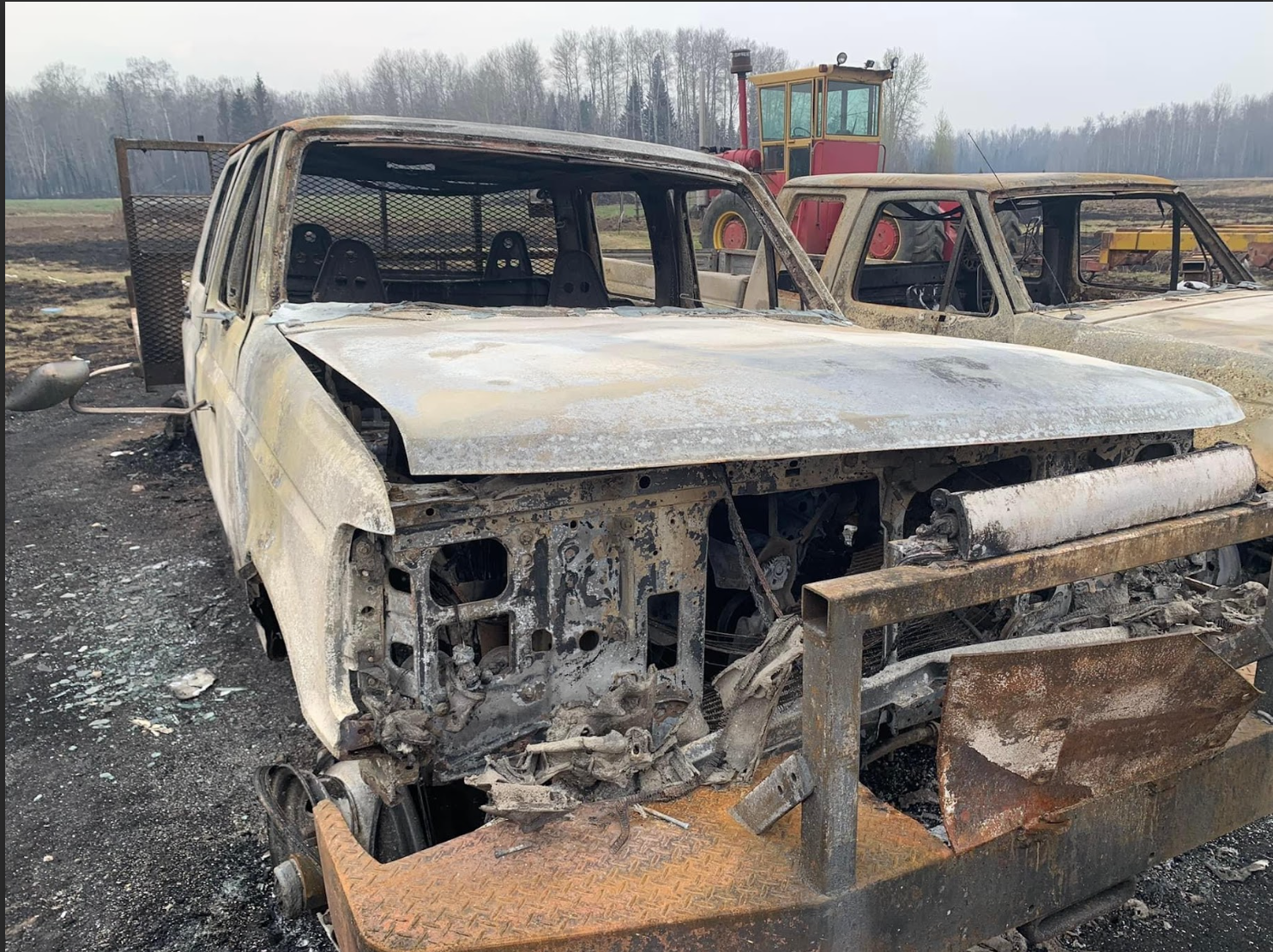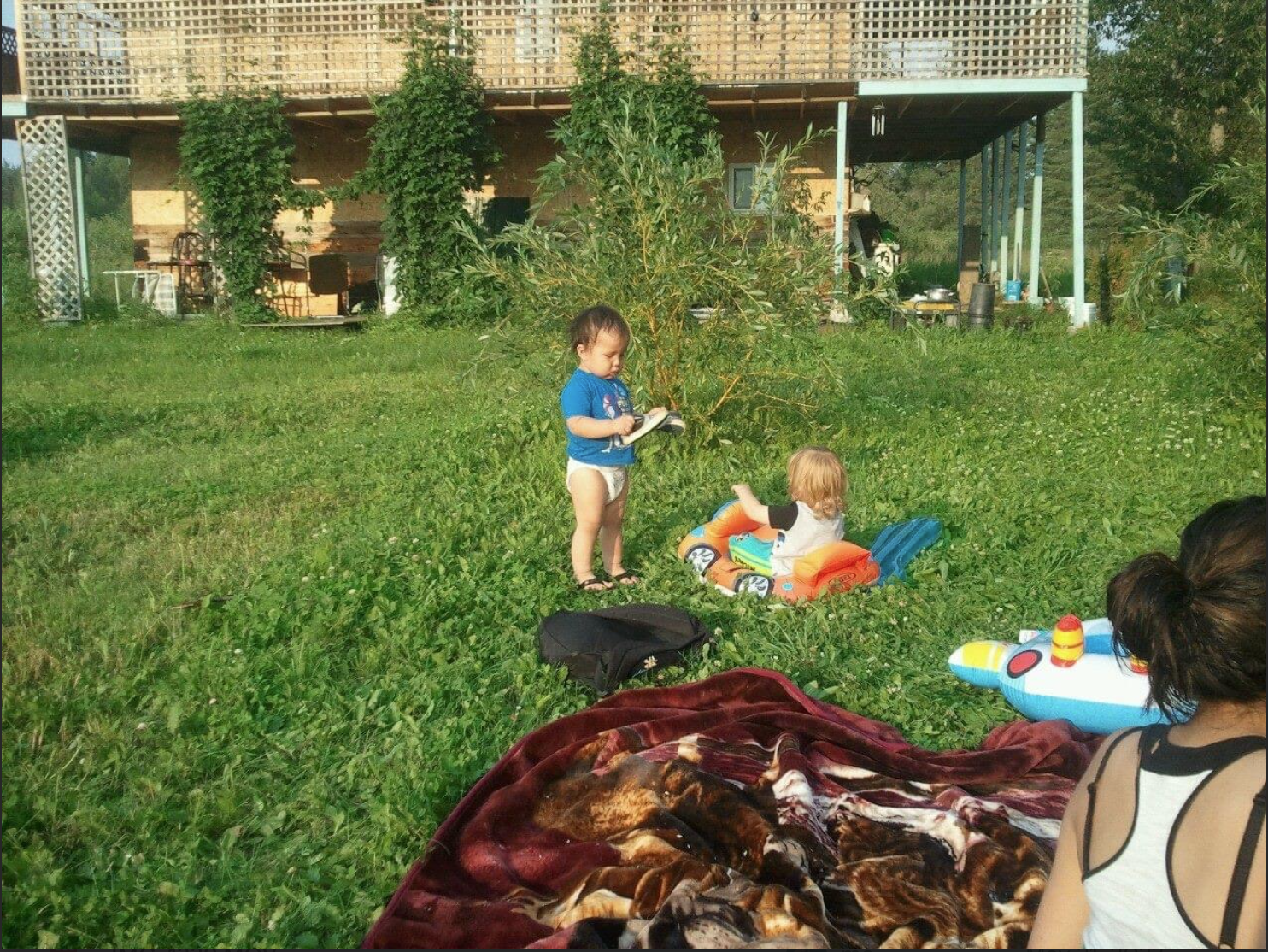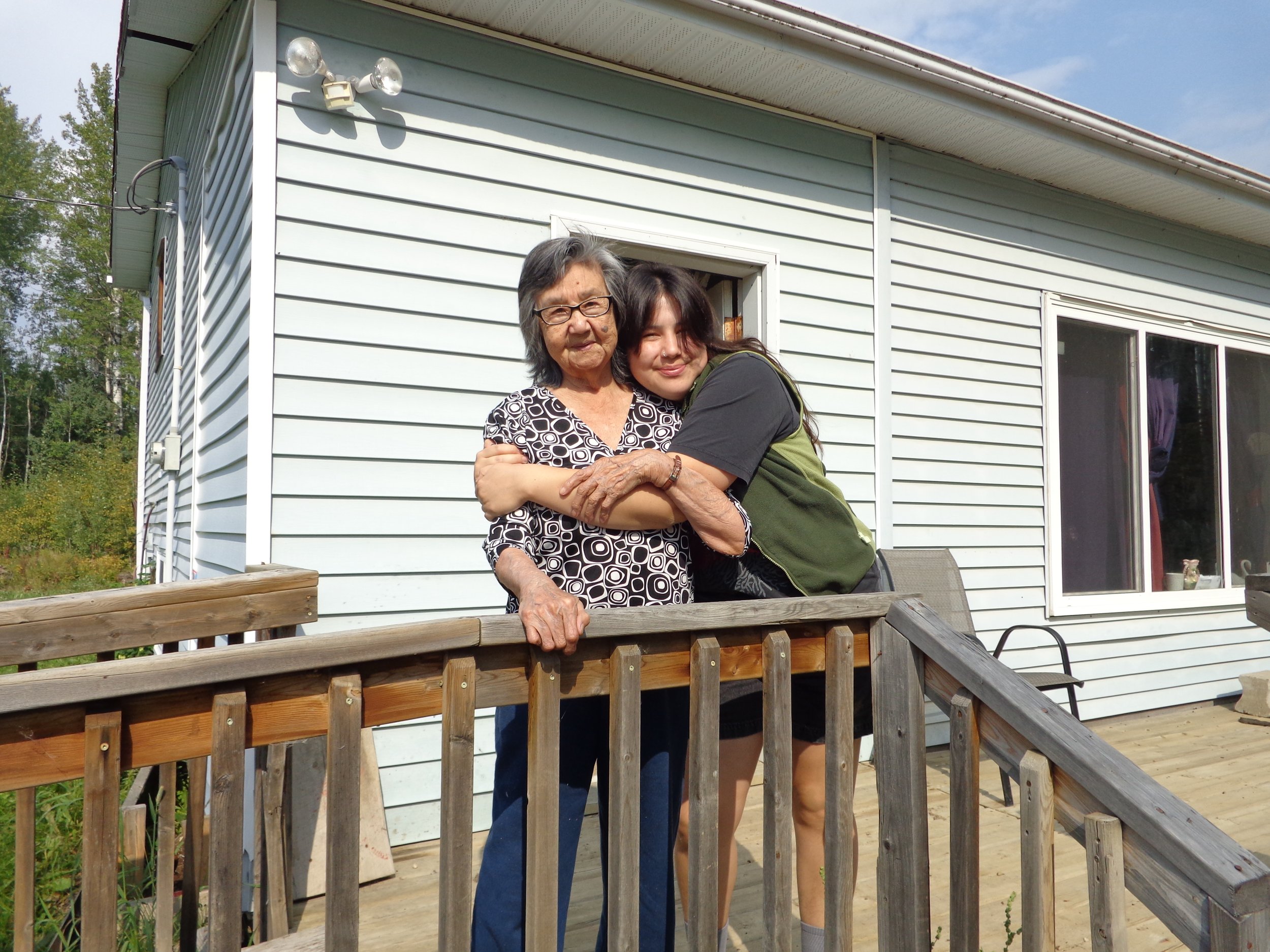Cree Nomad: Why I’m Going to COP
Photo provided by Britney Supernault
My home community, East Prairie Metis Settlement, burned in an uncontrollable, widespread, and devastating wildfire in early May this year. The fire, named the Grizzly Complex was actually three (3) separate wildfires that converged and because of excessively dry conditions, burned fast and couldn’t be controlled. By the end of it, spanning over weeks, not days, 40 homes had been lost - 14 of which were occupied by families - and an important bridge leading to an area of homes. No lives were lost, thanks to evacuation processes and the guidance of the community firefighters. However, we lost important hectares of forest that our community relied on for medicine gathering, berry picking, and hunting.
The devastation of the fire cannot be estimated yet. Trees burned, trapping lines were disintegrated, and our community returned to a home of scorched trees and fields where there had been kilometers of green. Thankfully, there are still some areas untouched by the fire, where we see glimpses of our old home passed to us through family and where we can continue to practice our cultural rights. Yet, in places like my mother’s home, my father’s home, and my sister’s home, there are blackened poles and soot instead of trees and dirt. For my father and sisters, burnt and twisted metal and ash instead of houses.
Photo provided by Britney Supernault
The area near my mother's trailer where I had grown up was full of soft muskeg, beautiful white poplar, and tall spruce trees. My fonder memories of childhood were in the shadows of those trees where I ran through the bush with my cousins and siblings. We’d jump from fallen trees onto the soft muskeg, and we’d trek through the wilderness like explorers. My mother would take us out to gather berries, or she would go on long walks alone in her quartersection. Now most of it is gone. Now, you can see nearly a mile into the treeline because the greenery is gone.
Photo provided by Britney Supernault
Sometimes the facts about climate change events like wildfires, the ones I mentioned in the first paragraph, cause us to overlook the psychological wounds of those experiencing them. It’s easy to forget that the numbers mentioned are all real people, real families, with memories and livelihoods attached to their homes and communities; communities that are drastically changed by these climate change events. And there is no denying that these are climate change events - weather and ecological phenomena driven and exasperated by a changing climate.
Wildfires, floods, hurricanes, droughts, typhoons, and tornados are all parts of a normal and healthy global system. The same goes for cycles of warmer and colder temperatures. No one is saying that these are happening due to climate change. That’s not what Climate Change events are. Instead, think of it as a body having an underlying autoimmune disorder - or any illness where the immune system is in some way compromised. To this body, now, the common cold and flu are dangerous. Even cuts to the skin are dangerous. Climate Change is like an autoimmune disease for our planet - and so these normal weather events change and become extreme weather events that pose a real and substantial threat. And they begin to happen more regularly.
“What does mitigation look like? Transitioning to cleaner sources of energy to stave off the increasing global temperature. Implementing widespread funding for solutions from both the science community and Indigenous groups that hold thousands of years of ecological knowledge. ”
Photo provided by Britney Supernault
Wildfires like the Grizzly Complex, which burned fast and uncontrollably for weeks, become commonplace. So do the heatwaves that made June, July, and August this year among the highest recorded in human history. So do the floods that swept away entire towns in Libya and killed 10,000 people. As climate change accelerates, these extreme weather events will increase as well; in destruction and frequency. We are past the point of stopping climate change, so we are largely working toward mitigation of these climate change events.
What does mitigation look like? Transitioning to cleaner sources of energy to stave off the increasing global temperature. Implementing widespread funding for solutions from both the science community and Indigenous groups that hold thousands of years of ecological knowledge. Ensuring that there are procedures in place to provide swift aid for communities experiencing extreme weather events, as well as support in the rebuilding process in case of damage.
Photo provided by Britney Supernault
The last of those is very important to me. Equitable resource distribution in the face of extreme weather events to all communities, not just cities and other colonial townships. Basically, provincial and federal aid should be available swiftly for both rural and urban communities. Basically, Indigenous communities - settlements and reservations - should receive just as much aid from the military, firefighters, and other facets of federal and provincial emergency responses as towns and cities. It isn’t our fault that our communities are so out of the way - it’s a footprint left by a violent, ignorant, and colonial government. The same government that put all Indigenous children in Residential Schools.
When my community burned, it took weeks for the governments to do anything. Our community firefighters, my cousins, and uncles were the ones who had to spend 24-hour days on the frontlines of a raging and unpredictable fire. The only help received in those first crucial days of attempting to stave off the force of a hungry fire and a dry environment in an unprecedented fire season were other firefighters from surrounding communities. They did their best to save as many homes as they could while the community burned, and tried to direct the blaze away from populated areas. And they did fantastic work; our entire settlement is indebted to them.
However, I can’t help but wonder if any outcomes would be different if our rural Indigenous community received as swift of help from the government as townships like Drayton Valley, which faced the possibility of being impacted by a wildfire. Maybe our community wouldn’t have spent as much time displaced as they did - my kokum was forced to stay in a hotel room from early May to late June. Maybe there wouldn’t have been injuries to any of our firefighters - my cousins and uncles. Maybe my Dad would still have his home, a cabin he worked hard to build throughout my childhood, and he wouldn’t be forced to restart at 68 years old. Maybe people wouldn’t still be displaced 7 months after the fire.
“Indigenous groups around the world were the first stewards of Earth. In our natural and kinship laws - in Wahkohtowin, a Cree word for our interconnectedness with the world around us - we built a way of life that respected and honored the environment we lived in. ”
Going to spaces like COP28 to champion our rights as Indigenous Peoples in colonial countries ensures that we aren’t left behind in all the policies and agreements being negotiated. While I believe bureaucracy slows down our progress, it is still important that we show up to these mainly non-indigenous spaces; and that we bring our stories to the forefront. As long as these meetings are happening, Indigenous people must be present; that is our resistance. Because it is obvious that without a clear Indigenous presence, we will continue to be left behind, exploited, and commodified by our colonial government systems. And it is especially important that we show up when Earth Mother is being discussed.
Photo provided by Britney Supernault
Indigenous groups around the world were the first stewards of Earth. In our natural and kinship laws - in Wahkohtowin, a Cree word for our interconnectedness with the world around us - we built a way of life that respected and honored the environment we lived in. We never took, we reciprocated. Whenever we pick medicine, hunt an animal, or gather berries we put down an offering, giving our thanks to these plants and animals that help us by feeding us, healing us, and supporting our lives. We understood that there is no such thing as take, take, take. There will be give, somewhere, eventually. The give we see now is Climate Change; a body fighting against that which makes it sick.
We are ready to share our knowledge and have been ready since we started noticing the changes in our own environment. Indigenous Peoples are among the only left who still rely directly and heavily on the land. We hunt to supplement our groceries. We pick plants for our medicines. We do ceremonies out on the land and water. Our lives are the most intertwined with our environment - meaning that we notice changes first. That also means, unfortunately, that we are being affected by a changing climate first.
You don’t need to look far to see where our communities are being affected by Climate Change. Talk to the hunters and they’ll tell you how the elk aren’t fattening as much anymore and the animal paths have changed and become confused thanks to the weird weather patterns. Talk to the mothers and they’ll tell you that it’s harder to gather medicines and leaves for tea because it’s too hot and dry, and the natural life cycles of the plants are being disrupted. Talk to Elders and they’ll tell you how exactly we can go back to taking care of the Earth the way we’ve been doing for tens of thousands of years.
“Talk to the mothers and they’ll tell you that it’s harder to gather medicines and leaves for tea because it’s too hot and dry, and the natural life cycles of the plants are being disrupted. Talk to Elders and they’ll tell you how exactly we can go back to taking care of the Earth the way we’ve been doing for tens of thousands of years.”
Photo provided by Britney Supernault
It is obvious that our communities, Indigenous communities, spread out and rural, will suffer the most from extreme weather events. Our cultural practices will suffer from the nearly undetectable - a 1.5*C rise in temperature, a year with less rain, a year of less snow, a year of an earlier spring, and a later fall. Attending climate change conferences on a scale as large as the UN’s COP28 ensures that our stories and knowledge are brought to a global stage. It’s our responsibility as the original land stewards to make a stand now and make people, governments, and corporations listen to us. We hold the keys to a sustainable future - to the global population having a future.
All of this; the story I have shared, the knowledge I extend, and the realities of our changing climate is the reason I am attending COP28. I go as a representative of a community still rebuilding, as an Otipemisowak Nêhiyawk with a responsibility as a land stewar, as a youth in want of a viable future, and as a voice for the Elders and members of my community who have much to pass on but not the opportunity. As long as there are tables and rooms where they don’t want us, we as Indigenous People have a responsibility to make a space for ourselves; not just for us, but for those who will come after.
About the Author
Britney Supernault (she/they), known as the Cree Nomad, is Otipemisiwak Nehiyaw (Métis Cree) from East Prairie Metis Settlement. An artist, activist, and writer, Britney has spent the last 4 years writing on various topics, from traveling and productivity to contemporary Indigenous Issues and Climate Change. They write full-time and also has a social media platform where they share their life as a writer. Britney is currently working on their debut novel, soon to be released, and an Indigenous graphic novel series.
Britney will be joining ICA as part of our COP28 delegation and LCIPP Knowledge Holder.









